This piece is part of the Center for Middle East Policy’s Israel-Gaza interviews series, in which leading experts unpack the conflict via in-depth Q&As. For an in-depth discussion of the choices facing the Houthis in 2024, and their possible consequences for both the group’s relationship with the international community and Yemen’s trajectory, see Allison Minor’s recent article, “An inflection point for the Houthis.”
The Houthis' rise to power
KEVIN HUGGARD:
Could you start with the basics of the Houthi movement? When and where did it emerge, and how have the Houthis come to rule much of Yemen?
ALLISON MINOR:
The Houthi movement emerged over two decades ago when a religious revivalist movement fused with anti-American sentiment and social discontent in a marginalized region of northern Yemen. The Houthis are motivated by fervent religious belief and a commitment to fighting corruption and imposing their social-political model in Yemen and potentially beyond. They have demonstrated a unique ability to adapt and seize windows of opportunity in Yemen’s tumultuous political environment.
Twenty years ago, the Yemeni government of former President Ali Abdullah Saleh launched a series of military campaigns against the Houthis in response to their growing popularity. However, the Houthis coalesced during this period and asserted themselves as a formidable and resilient fighting force.
After popular protests and elite wrangling ousted Saleh in 2011, the Houthis adapted again, joining the protests and transition process. In 2015, in an unlikely turn of events, Saleh allied with the Houthis, whom he viewed as his best path to reassuming power. Yet this plan eventually backfired, and the Houthis killed him in 2017. The Houthis used Saleh’s considerable resources and network to rapidly expand their control across northern Yemen. In September 2014, the Houthis seized Yemen’s capital, Sanaa, and eventually overthrew the transitional government. A Saudi-led coalition campaign launched in 2015 pushed the Houthis out of southern Yemen but left the Houthis in control of most of northern Yemen.
Fueled by Iranian military support and expertise, the Houthis used the nearly decade-long war to dramatically expand their military capabilities and cement their highly oppressive control of northern Yemen.
The Houthis and Iran
KEVIN HUGGARD:
What is the nature of the Houthis’ relationship with Iran? Should they be understood as an independent actor with their own interests, an Iranian proxy, or something in-between?
ALLISON MINOR:
The Houthis are more of an Iranian partner than a proxy, but their rapid surge in aerial warfare capabilities would not have been possible absent Iranian support. Iran-Houthi ties began early but expanded significantly after the Houthis demonstrated their potential to threaten Saudi Arabia. While the Islamic Revolutionary Guard Corps now enjoys significant influence in Yemen, Iran does not dictate the Houthis’ behavior. The Houthis’ hostility to foreign intervention means they will seek to protect a degree of independence and self-sufficiency. The Houthis have asserted this independence in key moments when their interests diverged from Iran’s, meaning that solutions in Yemen must run through Sanaa, not simply Tehran.
The Houthi movement is rooted in an extremist form of Zaydi Shiite Islam. Zaydis do not believe in ayatollahs and thus their religious allegiance is distinct from Iranian proxies like Lebanese Hezbollah. Many Zaydi beliefs more closely resemble Sunni beliefs—especially those of the Shafi’i Sunni school that is dominant in Yemen—than they do the “Twelver” Shiite beliefs of Iran. However, the Houthis have increasingly adopted practices and beliefs more typical of Twelver Islam, such as the celebration of Ashura, reflecting the deepening of the Iran-Houthi relationship.
The Houthis also reportedly benefit from the expertise of Iranian proxies, including Lebanese Hezbollah. There are signs of a distinct, growing relationship between the Houthis and these proxies, including one instance where the Houthis petitioned Yemenis (who are, of course, themselves impoverished) to raise funds for Hezbollah.
The Houthis' motivations
KEVIN HUGGARD:
Houthi officials have said that they are attacking shipping in the Red Sea and Gulf of Aden in protest of Israel’s military campaign in the Gaza Strip. How do you understand the Houthis’ motivations for intervening in the conflict between Israel and Hamas?
ALLISON MINOR:
The Houthis’ motivations are three-fold:
- Uphold a core tenant of their ideological agenda. The Houthis’ founding slogan calls for death to America and Israel and a curse on all Jewish people.
- Rally domestic support inside Yemen. A prolonged cease-fire with the Saudi-led coalition was stressing the Houthis’ wartime coalition and approach to governing, which had forced Yemenis to accept unprecedented oppression and a dismal economy and services under the rationale that the Houthis were defending Yemen from foreign aggression.
- Assert themselves as a major regional player.
After their initial attempts to attack Israel itself were unsuccessful, the Houthis pivoted to attacking ships in the Red Sea. The Houthis’ attacks quickly expanded from only targeting Israeli ships to targeting ships bound for Israel, ships with tenuous Israeli connections, and ships with no connection to Israel whatsoever. This is in part because the attacks are performative: the Houthis benefit from continual headlines about their attacks and do not necessarily need to demonstrate any impact on Israel. However, the attacks are also about more than what is happening in Gaza. The Houthis are now using them to assert their power and add a powerful new tool to their growing toolbox.
Discouraging the Houthis' attacks
KEVIN HUGGARD:
The United States and its allies have responded to the attacks on international shipping with strikes against Houthi positions in Yemen. What tools do the United States and others have to discourage further Houthi attacks? What obstacles exist to delivering the “clear, unified messaging” that you describe as essential for doing so?
ALLISON MINOR:
Only diplomatic measures can stop the Houthis’ attacks in the Red Sea. While targeted strikes have reportedly destroyed a quarter of the Houthis’ capabilities, the Houthis are adept at protecting military assets after years of Saudi-led airstrikes. The challenge before the international community is finding an off-ramp and the right combination of costs and benefits to convince the Houthis to stop their attacks. Doing so will not be easy, as all the tools available are imperfect. Still, there may be reasons to be hopeful: the more politically minded senior Houthi officials have made statements in support of de-escalation, suggesting the Houthis understand the need to downplay their actions with some audiences and maintain a path to negotiations, at some point in time.
De-escalation elsewhere in the region (though itself a complex endeavor) would create a more conducive environment for dialogue, reduce the degree to which the Houthis benefit from attacks, and address the Houthis’ stated motivations. But given the Houthis’ multiple reasons for conducting the attacks and the current level of hostility, doing so may not be enough.
Targeted strikes are a tool for imposing consequences on the Houthis, but such strikes also make it more difficult to find an off-ramp and risk further escalation.
The Biden administration’s recently-announced Specially Designated Global Terrorist sanctions will likely have consequences for the Houthis and Yemen’s already fragile economy, as financial institutions and other commercial actors seek to avoid any interaction with the Houthi-affiliated bodies that now dominate much of northern Yemen’s economy It is difficult to shield Yemeni civilians from these consequences, though the Biden administration announced unprecedented carve-outs in the hopes of doing so. The fact that the administration provided 30 days of advance warning before the sanctions go into effect has the benefit of keeping space open for diplomacy.
As I discuss in my article, the most significant consequences of the Houthis’ attacks follow logically from the Houthis’ actions themselves, not U.S. decisions. These include preventing much-needed foreign investment and disrupting Yemen’s peace process. The international community must ensure the Houthis understand these consequences and how they are connected to the Houthis’ actions.
All these tools are best wielded multilaterally to communicate to the Houthis that their actions not only isolate them from the United States and its closest allies (the consequences of which may be manageable) but from the international community more broadly.
The Houthis’ attacks are impacting both China, which is vulnerable to the attacks’ trade disruption, and Russia, whose oil ships have repeatedly been mistakenly targeted by Houthi attacks. This helps explain why the United States was able to secure a United Nations Security Council resolution condemning the Houthis’ attacks. Yet a truly unified international front is not possible; amid broader geopolitical tensions, China and Russia see instability in the Middle East as an opportunity to criticize the United States. The Houthis’ promises to not attack Russian and Chinese vessels seek to further rupture international unity. In light of the geopolitical environment and active Houthi outreach to Russia and China, multilateral actions (such as U.N. sanctions against Houthi actors) are unlikely.
Even U.S. regional partners like Saudi Arabia and the United Arab Emirates are hesitant to publicly support efforts to rein in the Houthis for fear of reigniting Houthi attacks on their territories or being seen as joining the U.S.-Israeli side of a regional conflict. Limited regional support adds to the Houthis’ calculus that they can weather the consequences of their attacks.
The potential for peace in Yemen
KEVIN HUGGARD:
Fighting in Yemen’s civil war has quieted since an April 2022 truce. Why, as you noted in your piece, is early 2024 a particularly important and delicate moment for conflict resolution efforts?
ALLISON MINOR:
As illustrated by the U.N.’s recent announcement that progress has been made toward a peace process roadmap, it is apparent that quiet talks between the conflict’s parties have progressed farther than at any point since 2016. The roadmap seeks to address issues underpinning Yemen’s conflict, including paying all public sector salaries and resuming oil exports, as the parties aim for a political agreement.
Further progress on peace efforts will likely bring significant international economic support and formal legitimacy for the Houthis. This means the international community must decide what kind of Houthi behavior it can accept. The Houthis must also decide if they want to moderate their behavior in exchange for the substantial benefits that legitimacy and participation in the international community will provide, or if they prefer international isolation, with any limited international support gained only at the barrel of a gun.
Escalation may jeopardize anti-Houthi actors’ support for peace efforts. Some influential Yemeni groups have begun calling for international support for renewed military offensives against the Houthis, hoping to leverage growing international hostility toward the Houthis to shift Yemen’s balance of power. Some U.S. commentators agree with this approach. It is not clear, however, why such offensives would have different outcomes than the Saudi- and Emirati-supported offensives that made only marginal gains over the past five years.
Yemen's humanitarian crisis
KEVIN HUGGARD:
Relatedly, how does the present escalation between the Houthis and the United States threaten efforts to ease Yemen’s ongoing humanitarian crisis, which, as you note, has left 21.6 million people in need of assistance?
ALLISON MINOR:
Yemen’s humanitarian crisis can only be reversed through a political agreement and economic recovery process. Therefore, by threatening Yemen’s peace efforts, the recent escalation may have devastating humanitarian consequences.
Trade disruption could drive up costs for Yemenis who already struggle to afford food and other basic goods. The World Food Program is reporting a decline in imports and growing food access issues, and it projects these will worsen due to Red Sea instability. Humanitarians are also expressing concern that military activity could disrupt their ability to operate. Finally, if the Houthis choose the path of international isolation, they may increase their already debilitating attempts to interfere in humanitarian operations.
-
Acknowledgements and disclosures
The views expressed in this article are the author’s own, and not necessarily those of the U.S. government.
The Brookings Institution is committed to quality, independence, and impact.
We are supported by a diverse array of funders. In line with our values and policies, each Brookings publication represents the sole views of its author(s).
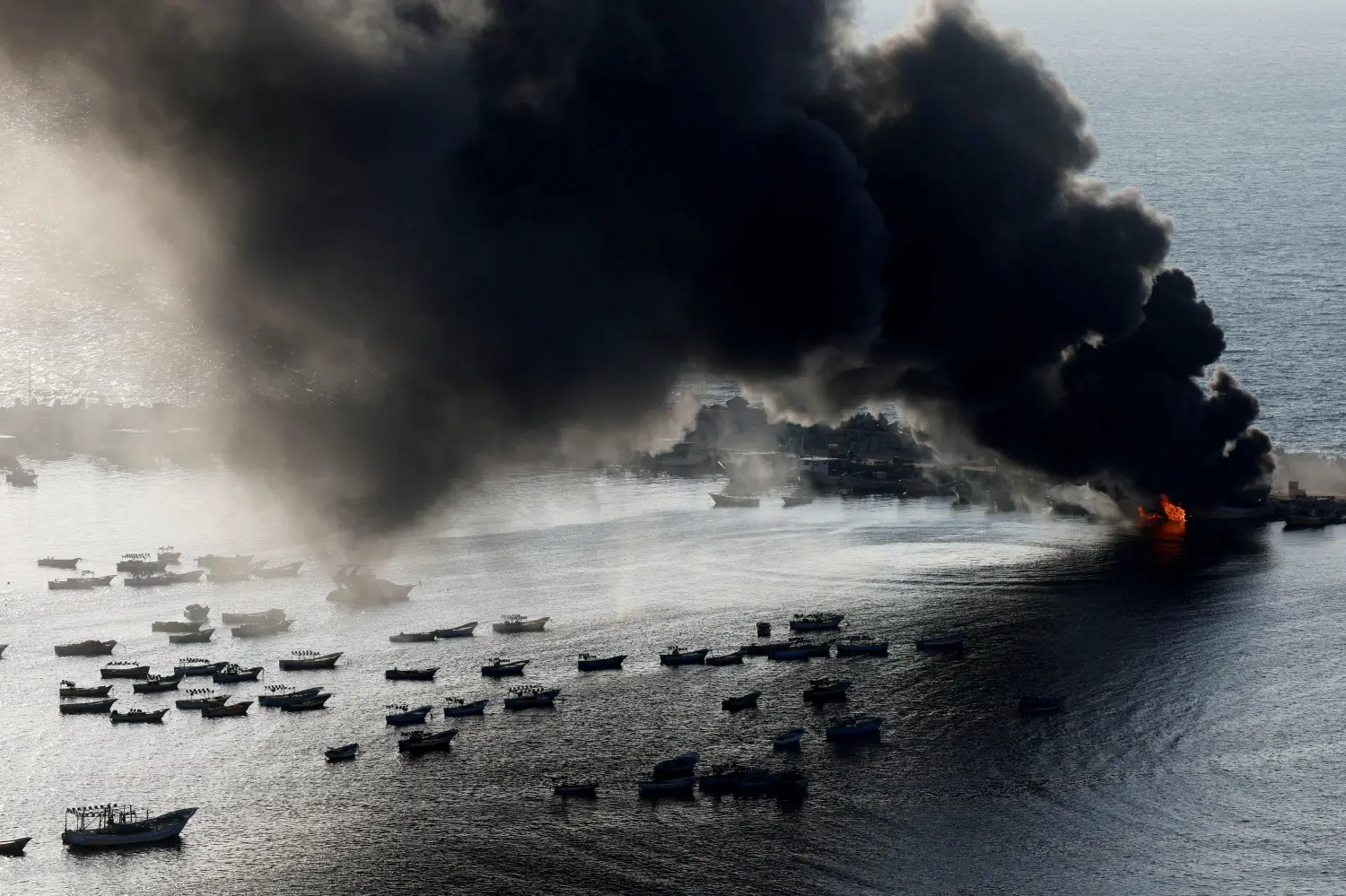


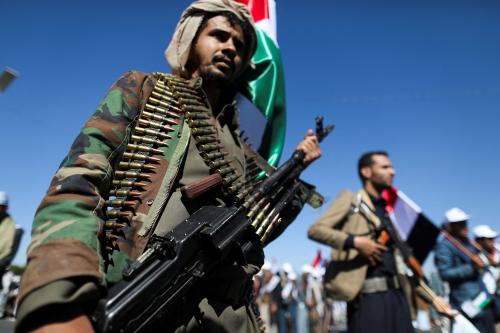

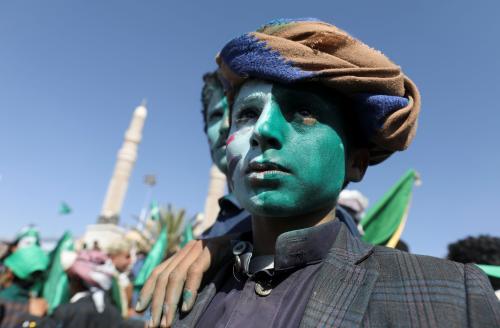
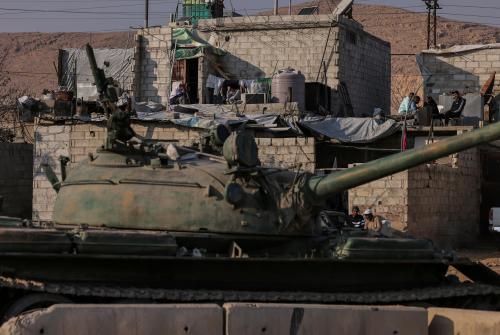
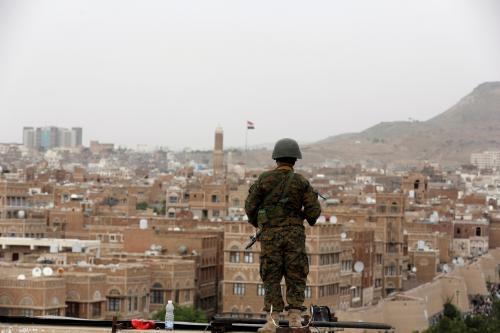
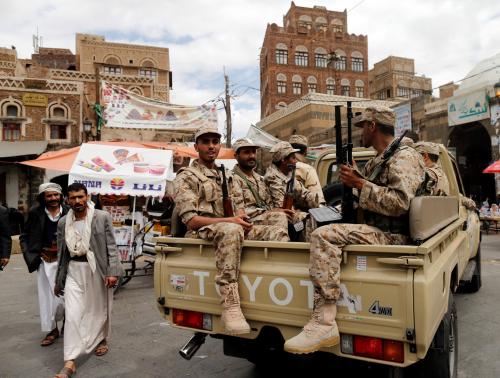
Commentary
How the Houthis joined the Israel-Gaza crisis
January 31, 2024